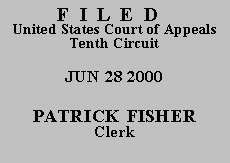

| GAVIN D. SCOTT,
vs.
HON. DAVID W. KENNEDY,
District Court Judge, Division 4, 18th
Judicial District for the State of
Kansas |
|
Mr. Scott was convicted by a jury of capital murder, among other crimes, and sentenced to death on August 21, 1998. On February 12, 1999, the trial court found that Mr. Scott had been denied a fair and impartial sentencing hearing due to the presence of a Bible and other religious items present during jury deliberations. The court set aside Mr. Scott's death sentence and ordered a new sentencing hearing.
On May 18, 1999, Mr. Scott filed a Petition for a Writ of Mandamus with the Kansas Supreme Court, requesting that court to order the trial court to cancel the second sentencing hearing and sentence him to life as a matter of law. On June 7, 1999, Mr. Scott filed the instant § 2241 motion in federal district court. The next day, the Kansas Supreme Court denied mandamus relief. On June 9, 1999, the district court denied Mr. Scott's habeas petition on the merits. Subsequently, both the district court and this court denied emergency motions to stay the second sentencing hearing, and that hearing was held on June 14, 1999, at which time Mr. Scott again received a sentence of death.
Mr. Scott's direct criminal appeal of his conviction and sentencing is currently pending before the Kansas courts. While appellant was not foreclosed from seeking federal intervention prior to his second sentencing hearing, because that relief was denied and Mr. Scott has now been formally sentenced, he cannot maintain this action in federal court until the Kansas Supreme Court has had an opportunity to address his direct appeal. See Coleman v. Thompson, 501 U.S. 722, 731 (1991) (exhaustion requirement grounded in principles of comity; state courts should be given the first opportunity to correct constitutional violations); Capps v. Sullivan, 13 F.3d 350, 354 n.2 (10th Cir. 1993) ("'federal courts should abstain from the exercise of [§ 2241] jurisdiction if the issues raised in the petition may be resolved either by trial on the merits in the state court or by other state procedures available to the petitioner.'" (citation omitted)).
The wisdom of this doctrine is apparent in this case, because the state court, which has yet to rule on Mr. Scott's appeal, could overturn his conviction or sentence on a number of grounds, rendering our opinion merely advisory. We remand to the district court to dismiss the petition without prejudice for failure to exhaust state remedies.
Entered for the Court
Paul J. Kelly, Jr.
Circuit Judge
*. This order and judgment is not binding precedent, except under the doctrines of law of the case, res judicata, and collateral estoppel. This court generally disfavors the citation of orders and judgments; nevertheless, an order and judgment may be cited under the terms and conditions of 10th Cir. R. 36.3.